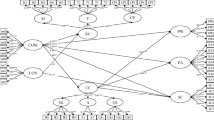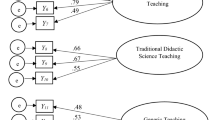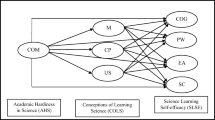Abstract
This study aimed to investigate the factors accounting for science learning self-efficacy (the specific beliefs that people have in their ability to complete tasks in science learning) from both the teacher and the student levels. We thus propose a multilevel model to delineate its relationships with teacher and student science hardiness (i.e., the courage that is needed to turn stressful changes from burdens into advantageous growth in science education settings). The current research was conducted through collecting survey responses from both teachers (i.e., using the self-report teacher science hardiness questionnaire) and students (i.e., using the self-report student science hardiness and the self-report science learning self-efficacy questionnaires). A total of 45 Taiwanese science teachers were solicited from junior high schools. Also, we recruited students who were taught by these 45 teachers. In total, 1145 junior high school students whose ages ranged from 12 to 16, with a mean of 13.68 (SD = 0.90), were invited to take part in the study. Of these students, 268 were in the seventh grade, 430 were in the eighth grade, and 447 were in the ninth grade. The results of hierarchical linear modeling (HLM) confirmed our hypothesis that teacher science hardiness fostered student science hardiness, which in turn contributed to the students’ science learning self-efficacy. The findings revealed that both teacher and student science hardiness play important roles in explaining the structure of science learning self-efficacy. To enhance science learning self-efficacy, educators should develop programs for teachers and students to increase their science hardiness.

Similar content being viewed by others
References
Ball, D. L., & Cohen, D. K. (1996). Reform by the book: what is—or might be—the role of curriculum materials in teacher learning and instructional reform. Educational Researcher, 25(9), 6–8. 14.
Bandura, A. (1977). Self-efficacy: toward a unifying theory of behavioral change. Psychological Review, 84(2), 191–215.
Bandura, A. (1981). Self-referent thought: a developmental analysis of self-efficacy. In J. H. Flavell & L. Ross (Eds.), Social cognitive development frontiers and possible futures (pp. 200–239). Cambridge: Cambridge University Press.
Baron, R. M., & Kenny, D. A. (1986). The moderator-mediator variable distinction in social psychological research: conceptual, strategic, and statistical considerations. Journal of Personality and Social Psychology, 51(6), 1173–1182.
Benishek, L. A., Feldman, J. M., Shipon, R. W., Mecham, S. D., & Lopez, F. G. (2005). Development and evaluation of the revised academic hardiness scale. Journal of Career Assessment, 13(1), 59–76. doi:10.1177/1069072704270274.
Benishek, L. A., & Lopez, F. G. (2001). Development and initial validation of a measure of academic hardiness. Journal of Career Assessment, 9(4), 333–352. doi:10.1177/106907270100900402.
Capa, A. Y., & Uzuntiryaki, E. (2009). Development and psychometric evaluation of the high school chemistry self-efficacy scale. Educational and Psychological Measurement, 69, 868–880.
Chiou, G. L., & Liang, J. C. (2012). Exploring the structure of science self-efficacy: a model built on high school students’ conceptions of learning and approaches to learning in science. Asia-Pacific Education Researcher, 21(1), 83–91.
Creed, P. A., Conlon, E. G., & Dhaliwal, K. (2013). Revisiting the academic hardiness scale: revision and revalidation. Journal of Career Assessment, 21(4), 537–554. doi:10.1177/1069072712475285.
Diseth, A., Meland, E., & Breidablik, H. J. (2014). Self-beliefs among students: grade level and gender differences in self-esteem, self-efficacy and implicit theories of intelligence. Learning and Individual Differences, 35, 1–8. doi:10.1016/j.lindif.2014.06.003.
Forbes, C. T., & Davis, E. A. (2010). Beginning elementary teachers’ curriculum design and development of pedagogical design capacity for science teaching: a longitudinal study. In L. E. Kattington (Ed.), Handbook of curriculum development (pp. 209–232). New York: Nova Science.
Güngören, S., & Sungur, S. (2009). The effect of grade level on elementary school students’ motivational beliefs in science. International Journal of Learning, 16(3), 495–506.
Güvercin, Ö. (2008). Investigating elementary students’ motivation towards science learning: a cross age study. Ankara: Master Middle East Technical University.
Gibbs, G., & Coffey, M. (2004). The impact of training of university teachers on their teaching skills, their approach to teaching and the approach to learning of their students. Active Learning in Higher Education, 5(1), 87–100. doi:10.1177/1469787404040463.
Gill, M. J., & Harris, S. L. (1991). Hardiness and social support as predictors of psychological discomfort in mothers of children with autism. Journal of Autism and Developmental Disorders, 21(4), 407–416.
Glynn, S. M., Brickman, P., Armstrong, N., & Taasoobshirazi, G. (2011). Science motivation questionnaire II: validation with science majors and nonscience majors. Journal of Research in Science Teaching, 48(10), 1159–1176. doi:10.1002/Tea.20442.
Gocer, F. Y., Sungur, S., & Tekkaya, C. (2011). Investigating elementary school students’ motivational traits in science classrooms. Egitim Ve Bilim-Education and Science, 36(161), 76–84.
Goodwin, K. S., Ostrom, L., & Scott, K. W. (2009). Gender differences in mathematics self-efficacy and back substitution in multiple-choice assessment. Journal of Adult Education, 38, 22–42.
Hong, Z. R., & Lin, H. S. (2011). An investigation of students’ personality traits and attitudes toward science. International Journal of Science Education, 33(7), 1001–1028. doi:10.1080/09500693.2010.524949.
Hair, J. F., Black, W. C., Babin, B. J., Anderson, R. E., & Tatham, R. L. (2006). Multivariate data analysis. New Jersey: Prentice-Hall.
Hong, Z. R., Lin, H. S., & Lawrenz, F. P. (2012). Effects of an integrated science and societal implication intervention on promoting adolescents’ positive thinking and emotional perceptions in learning science. International Journal of Science Education, 34(3), 329–352. doi:10.1080/09500693.2011.623727.
Huang, C. J. (2013). Gender differences in academic self-efficacy: a meta-analysis. European Journal of Psychology of Education, 28(1), 1–35. doi:10.1007/s10212-011-0097-y.
Junge, M. E., & Dretzke, B. J. (1995). Mathematical self-efficacy gender differences in gifted talented adolescents. Gifted Child Quarterly, 39(1), 22–26. doi:10.1177/001698629503900104.
Kamtsios, S., & Karagiannopoulou, E. (2013). Conceptualizing students’ academic hardiness dimensions: a qualitative study. European Journal of Psychology of Education, 28(3), 807–823. doi:10.1007/s10212-012-0141-6.
Kaya, S., & Rice, D. C. (2010). Multilevel effects of student and classroom factors on elementary science achievement in five countries. International Journal of Science Education, 32(10), 1337–1363. doi:10.1080/09500690903049785.
Kenny, D. A., Kashy, D., & Bolger, N. (1998). Data analysis in social psychology. In D. Gilbert, S. Fiske, & G. Lindzey (Eds.), Handbook of social psychology (4th ed., pp. 233–265). New York: McGraw-Hill.
Khoshaba, D. M., & Maddi, S. R. (2001). HardiTraining. Irvine: Hardiness Institute.
Kiran, D., & Sungur, S. (2012a). Middle school students’ science self-efficacy and its sources: examination of gender difference. Journal of Science Education and Technology, 21(5), 619–630. doi:10.1007/s10956-011-9351-y.
Kiran, D., & Sungur, S. (2012b). Sources and consequences of Turkish middle school students’ science self-efficacy. Asia-Pacific Education Researcher, 21(1), 172–180.
Lepper, M. R., Corpus, J. H., & Iyengar, S. S. (2005). Intrinsic and extrinsic motivational orientations in the classroom: age differences and academic correlates. Journal of Educational Psychology, 97(2), 184–196. doi:10.1037/0022-0663.97.2.184.
Lin, T.-J., Tan, A. L., & Tsai, C.-C. (2013). A cross-cultural comparison of Singaporean and Taiwanese eighth graders’ science learning self-efficacy from a multi-dimensional perspective. International Journal of Science Education, 35(7), 1083–1109. doi:10.1080/09500693.2013.776193.
Lin, T.-J., & Tsai, C.-C. (2013). A multi-dimensional instrument for evaluating Taiwanese high school students’ science learning self-efficacy in relation to their approaches to learning science. International Journal of Science and Mathematics Education, 11(6), 1275–1301. doi:10.1007/s10763-012-9376-6.
Maddi, S. R. (1987). Hardiness training at Illinois Bell Telephone. In: J. P. Opatz (Ed.), Health promotion evaluation (pp. 101–115). Stephens Point, WI: National Wellness Institute.
Maddi, S. R. (2013). Personal hardiness as the basis for resilience. In: S. R. Maddi (Ed.), Hardiness: turning stressful circumstances into resilient growth (pp. 7–17). New York: Springer.
Maddi, S. R., Harvey, R. H., Khoshaba, D. M., Fazel, M., & Resurreccion, N. (2009). Hardiness training facilitates performance in college. Journal of Positive Psychology, 4(6), 566–577. doi:10.1080/17439760903157133.
Maddi, S. R., Harvey, R. H., Khoshaba, D. M., Fazel, M., & Resurreccion, N. (2012). The relationship of hardiness and some other relevant variables to college performance. Journal of Humanistic Psychology, 52(2), 190–205. doi:10.1177/0022167811422497.
McNeill, K. L., Pimentel, D. S., & Strauss, E. G. (2013). The impact of high school science teachers’ beliefs, curricular enactments and experience on student learning during an inquiry-based urban ecology curriculum. International Journal of Science Education, 35(15), 2608–2644. doi:10.1080/09500693.2011.618193.
Palmer, D. (2006). Durability of changes in self-efficacy of preservice primary teachers. International Journal of Science Education, 28(6), 655–671. doi:10.1080/09500690500404599.
Puntambekar, S., Stylianou, A., & Goldstein, J. (2007). Comparing classroom enactments of an inquiry curriculum: lessons learned from two teachers. Journal of the Learning Sciences, 16(1), 81–130. doi:10.1207/s15327809jls1601_4.
Raudenbush, S. W., & Bryk, A. S. (2002). Hierarchical linear models: applications and data analysis methods (2nd ed.). Thousand Oaks: Sage.
Sheard, M. (2009). Hardiness commitment, gender, and age differentiate university academic performance. British Journal of Educational Psychology, 79, 189–204. doi:10.1348/000709908x304406.
Sheard, M., & Golby, J. (2007). Hardiness and undergraduate academic study: the moderating role of commitment. Personality and Individual Differences, 43(3), 579–588. doi:10.1016/j.paid.2007.01.006.
Thomas, G., Anderson, D., & Nashon, S. (2008). Development of an instrument designed to investigate elements of science students’ metacognition, self-efficacy and learning processes: the SEMLI-S. International Journal of Science Education, 30(13), 1701–1724. doi:10.1080/09500690701482493.
Tran, N. A. (2011). The relationship between students’ connections to out-of-school experiences and factors associated with science learning. International Journal of Science Education, 33(12), 1625–1651. doi:10.1080/09500693.2010.516030.
Troop-Gordon, W. (2015). The role of the classroom teacher in the lives of children victimized by peers. Child Development Perspectives, 9(1), 55–60. doi:10.1111/Cdep.12106.
Tsai, C.-C., Jessie Ho, H. N., Liang, J.-C., & Lin, H.-M. (2011). Scientific epistemic beliefs, conceptions of learning science and self-efficacy of learning science among high school students. Learning and Instruction, 21(6), 757–769. doi:10.1016/j.learninstruc.2011.05.002.
Tuan, H. L., Chin, C. C., & Shieh, S. H. (2005). The development of a questionnaire to measure students’ motivation towards science learning. International Journal of Science Education, 27(6), 639–654. doi:10.1080/0950096042000323737.
Usher, E. L., & Pajares, S. (2008). Sources of self-efficacy in school: critical review of the literature and future directions. Review of Educational Research, 78, 751–796.
Uzuntiryaki, E., & Capa, A. Y. (2009). Development and validation of chemistry self-efficacy scale for college student. Research in Science Education, 39, 539–551.
Webb-Williams, J. (2014). Gender differences in school children’s self-efficacy beliefs: students’ and teachers’ perspectives. Educational Research and Reviews, 9(3), 75–82. doi:10.5897/ERR2013.1653.
Weisgram, E. S., & Bigler, R. S. (2006). Girls and science careers: the role of altruistic values and attitudes about scientific tasks. Journal of Applied Developmental Psychology, 27(4), 326–348. doi:10.1016/j.appdev.2006.04.004.
Woltman, H., Feldstain, A., MacKay, J. C., & Rocchi, M. (2012). An introduction to hierarchical linear modeling. Tutorials in Quantitative Methods for Psychology, 8(1), 52–69.
Yoon, J., & Bauman, S. (2014). Teachers: a critical but overlooked component of bullying prevention and intervention. Theory Into Practice, 53(4), 308–314. doi:10.1080/00405841.2014.947226.
Zhang, Z., Zyphur, M. J., & Preacher, K. J. (2009). Testing multilevel mediation using hierarchical linear models problems and solutions. Organizational Research Methods, 12(4), 695–719. doi:10.1177/1094428108327450.
Author information
Authors and Affiliations
Corresponding authors
Additional information
Ya-Ling Wang (corresponding author). Postdoctoral Research Fellow, Graduate Institute of Digital Learning and Education, National Taiwan University of Science and Technology, Taiwan. E-mail: Patricia7247@gmail.com, ylwang47@mail.ntust.edu.tw. Tel: 886-2-27303219. Address: No. 43, Sec. 4, Keelung Rd., Taipei, 106, Taiwan
Current themes of research:
Educational psychology. Science education. Positive psychology.
Most relevant publications in the field of Psychology of Education:
Wang, Y.-L., Tsai, C.-C., & Wei, S.-H. (2015). The sources of science teaching self-efficacy among elementary school teachers: A mediational model approach. International Journal of Science Education, 37(14), 2264–2283. (SSCI)
Wang, Y. L., Lin, Y. C., Huang, C. L., & Yeh, K. H. (2012). Benefitting from a different perspective: The effect of a complementary matching of psychological distance and habitual perspective on emotion regulation. Asian Journal of Social Psychology, 15(3), 198–207. (SSCI)
Wang, Y. L., Tsai, S. L., Lin, Y. C., & Huang, C. L. (2013). Deficits in emotion inhibition or in strategy judgment? Investigating mechanisms of the inappropriateness of attachment anxiety. Formosa Journal of Mental Health, 26(2), 279–306. (TSSCI; in Chinese)
Sung, Y. T., Chao, T. Y., Wang, Y. L., Huang, L. Y., Chen, J. R., & Tseng, F. L. (2013). The development of the Examination Stress Scale for junior high school students. Psychological Testing, 60(2), 291–318. (TSSCI; in Chinese)
Chao, T. Y., Sung, Y. T., & Wang, Y. L. (2014). The development and application of coping with examination stress scale for high school students. Psychological Testing, 61(2), 283–310. (TSSCI; in Chinese)
Chin-Chung Tsai (corresponding author). Chair Professor, Graduate Institute of Digital Learning and Education, National Taiwan University of Science and Technology, Taiwan. E-mail: cctsai@mail.ntust.edu.tw. Address: No. 43, Sec. 4, Keelung Rd., Taipei, 106, Taiwan
Current themes of research:
Conceptions of learning. Epistemic beliefs. Science education
Most relevant publications in the field of Psychology of Education:
Tsai, C.-C. (2009). Conceptions of learning versus conceptions of web-based learning: The differences revealed by college students. Computers & Education, 53, 1092–1103.
Yang, Y.-F., & Tsai, C.-C. (2010). Conceptions of and approaches to learning through online peer assessment. Learning and Instruction, 20, 72–83.
Tsai, C.-C., Ho, H. N., Liang, J.-C., & Lin, H.-M. (2011). Scientific epistemic beliefs, conceptions of learning science and self-efficacy of learning science among high school students. Learning and Instruction, 21, 757–769.
Lin, C.-L., Tsai, C.-C., & Liang, J. C. (2012). An investigation of two profiles within conceptions of learning science: An examination of confirmatory factor analysis. European Journal of Psychology of Education, 27(4), 499–521.
Lee, M.-H., Lin, T.-J., & Tsai, C.-C. (2013). Proving or improving science learning? Understanding high school students’ conceptions of science assessment in Taiwan. Science Education, 97(2), 244–270.
Appendix
Appendix
Appendix 1: items of the student science hardiness questionnaire
-
1.
I take my work as a student seriously.
-
2.
I am a dedicated student
-
3.
I work hard for grades.
-
4.
I am involved in all my classes.
-
5.
Regardless of the class, I do my best.
-
6.
I make personal sacrifices to get good grades.
-
7.
Grades aren’t important to me.
Appendix 2: items of the SLSE questionnaire
-
1.
I can explain scientific laws and theories to others.
-
2.
I can choose an appropriate formula to solve a science problem.
-
3.
I can link the contents among different science subjects (for example biology, chemistry and physics) and establish the relationships between them.
-
4.
I know the definitions of basic scientific concepts (for example, gravity, photosynthesis, etc.) very well.
-
5.
I am able to read scientific figures and tables.
-
6.
I am able to critically evaluate the solutions of scientific problems.
-
7.
I am able to design scientific experiments to verify my hypotheses.
-
8.
I am able to propose many viable solutions to solve a science problem.
-
9.
When I come across a science problem, I will actively think over it first and devise a strategy to solve it.
-
10.
I am able to make systematic observations and inquiries based on a specific science concept or scientific phenomenon.
-
11.
When I am exploring a scientific phenomenon, I am able to observe its changing process and think of possible reasons behind it.
-
12.
I know how to carry out experimental procedures in the science laboratory.
-
13.
I know how to use equipment (for example measuring cylinders, measuring scales, etc.) in the science laboratory.
-
14.
I am able to read data from scientific experiments.
-
15.
I know how to set up equipment for laboratory experiments.
-
16.
I know how to collect data during the science laboratory.
-
17.
I am able to explain everyday life using scientific theories.
-
18.
I am able to propose solutions to everyday problems using science.
-
19.
I can understand the news/documentaries I watch on television related to science.
-
20.
I can recognize the careers related to science.
-
21.
I am able to apply what I have learned in school science to daily life.
-
22.
I am able to use scientific methods to solve problems in everyday life.
-
23.
I can understand and interpret social issues related to science (for example nuclear power usage and genetically modified foods) in a scientific manner.
-
24.
I am aware that a variety of phenomena in daily life involve science-related concepts.
-
25.
I am able to comment on presentations made by my classmates in science class.
-
26.
I am able to use what I have learned in science classes to discuss with others.
-
27.
I am able to clearly explain what I have learned to others.
-
28.
I feel comfortable discussing science content with my classmates.
-
29.
In science classes, I can clearly express my own opinions.
-
30.
In science classes, I can express my ideas properly.
Appendix 3: items of the teacher science hardiness questionnaire
-
1.
I take my work as a teacher seriously.
-
2.
I am a dedicated teacher.
-
3.
I work hard on my teaching.
-
4.
I am involved in all of the classes I teach.
-
5.
Regardless of the class, I do my best.
-
6.
I make personal sacrifices to teach well.
-
7.
Teaching well is as important to me as it is to my parents.
Rights and permissions
About this article
Cite this article
Wang, YL., Tsai, CC. Taiwanese students’ science learning self-efficacy and teacher and student science hardiness: a multilevel model approach. Eur J Psychol Educ 31, 537–555 (2016). https://doi.org/10.1007/s10212-015-0285-2
Received:
Revised:
Accepted:
Published:
Issue Date:
DOI: https://doi.org/10.1007/s10212-015-0285-2




